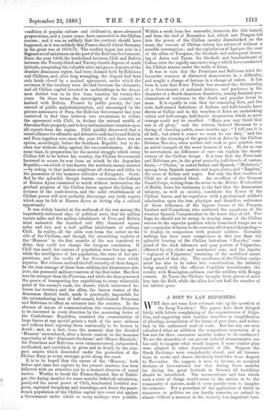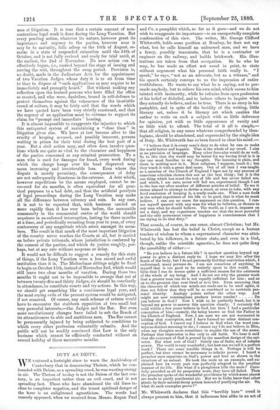A HINT TO LAW REFORMERS.
VVI1Y does not some Law reformer take up the question of the Long Vacation ? The papers have been deluged lately with letters complaining of the expensiveness of litiga- tion, and suggesting such familiar remedies as simplification of pleading, assimilation of the forms of procedure, and reduc- tion in the authorised scale of costs. But has any one ever calculated what an addition the compulsory suspension of a law. suit for three successive months makes to its costliness ? To see the absurdity of our present judicial arrangements, one has only to imagine what would happen if some similar plan were adopted in other departments of life. Suppose the Stock Exchange were compulsorily closed, and all transac- tions in stocks and shares absolutely forbidden from August to November. Or, suppose it were to become an accepted doctrine of international law that during those months (as during the great festivals in Greece) all hostilities should be interdicted. The inconvenience and loss which such a state of things would cause to the nation. or to the community of nations, make it seem puerile even to imagine its existence. Yet a procedure of the application of which to commerce or politics we can hardly conceive, we submit to almost without a murmur in the scarcely less important busi- ness of litigation. It is true that a certain amount of non- contentious legal work is done during the Long Vacation. But every pending action, whatever its nature, however great its importance and urgency to the parties, however near it may be to maturity, falls asleep on the 10th of August, re- mains in a state of suspended animation until the 24th of October, and is not fully revived and ready for trial until, at the earliest, the 2nd of November. No new action can be effectively begun, i.e., carried beyond the stage of issuing and serving the writ, throughout the same period. Provision is, no doubt, made in the Judicature Acts for the appointment of two Vacation Judges, whose duty it is to sit from time to time to dispose of "such applications as may require to be immediately and promptly heard." But without making any reflection upon the learned persons who have filled the office so created, and who were, doubtless, bound in self-defence to protect themselves against the vehemence of the insatiable crowd of suitors, it may be fairly said that the words which we have quoted have been very strictly construed, and that the urgency of an application must be extreme to support its claim for "prompt and immediate " hearing.
It is almost impossible to exaggerate the injustice to which this antiquated system of maintaining a "close time" in litigation gives rise. We have at last become alive to the cruelty of keeping accused, and possibly innocent, persons waiting in prison for their trial during the best part of a year. But a civil action may, and often does, involve ques- tions which are quite as vital to the character and happiness of the parties concerned as any criminal prosecution. To a man who is sued for damages for fraud, every week during which the charge hangs over his head disproved may mean increasing and irretrievable loss. Even where the dispute is merely pecuniary, the consequences of delay are not unfrequently disastrous in the extreme. A debt which, however expeditious be the means employed, cannot be re- covered for six months, is often equivalent for all prac- tical purposes to a bad debt, and thus the artificial paralysis of legal proceedings during the Long Vacation may make all the difference between solvency and ruin. In any case, it is not to be expected that, with business carried on more rapidly than it has ever been before, the mercantile community in the commercial centre of the world should acquiesce in an enforced interruption, lasting for three months at a time, and periodically recurring from year to year, of every controversy of any magnitude which arises amongst its mem- bers. The result is that much of the most important litigation of the country never reaches the Courts at all, but is carried on before private tribunals, whose jurisdiction is conferred by the consent of the parties, and which do justice roughly, per- haps, but at any rate without suspense or delay.
It would not be difficult to suggest a remedy for this state of things, if the Long Vacation were a less sacred and awful institution than it is. The Michaelmas sittings might be fixed to begin on October 15th, instead of November 2nd, which would still leave two clear months of vacation. During those two months it ought not to be impossible to arrange that out of between twenty-five and thirty Judges, six should be constantly in attendance, to constitute courts and try actions. In this way, we should get something like a continuous legal year, and the most crying evils of the present system would be mitigated, if not removed. Of course, any such scheme of reform would have to encounter the stubborn opposition of two small but very powerful interests,—the Judges and the Bar. But even more revolutionary changes have failed to rob the Bench of its attractiveness to able and ambitious men. The Bar cannot be permanently injured by being subjected to conditions to which every other profession voluntarily submits. And the public will not be readily convinced that Law is the only business which cannot be efficiently conducted without an annual holiday of three successive months.



































 Previous page
Previous page